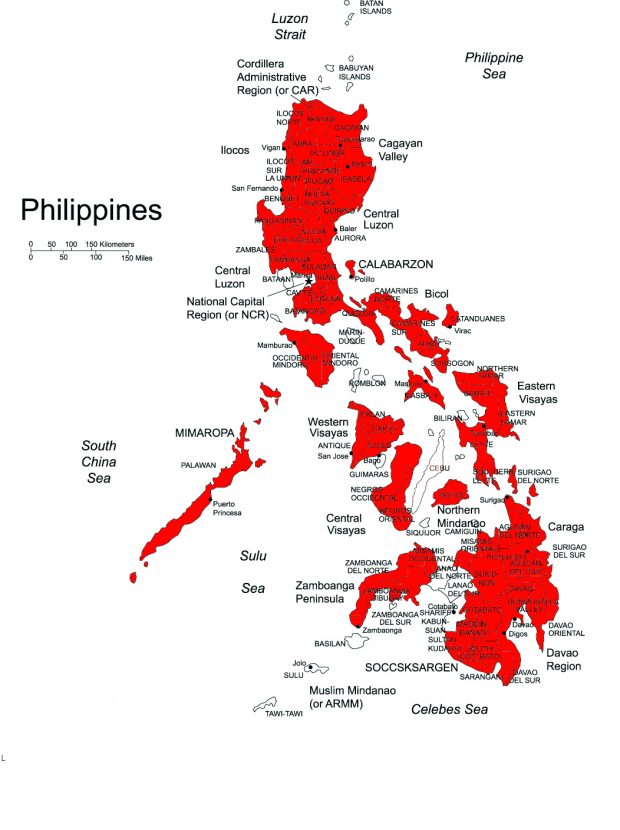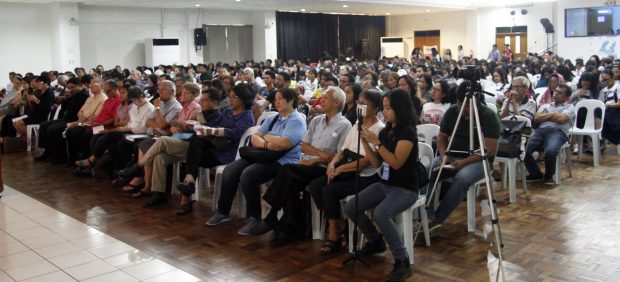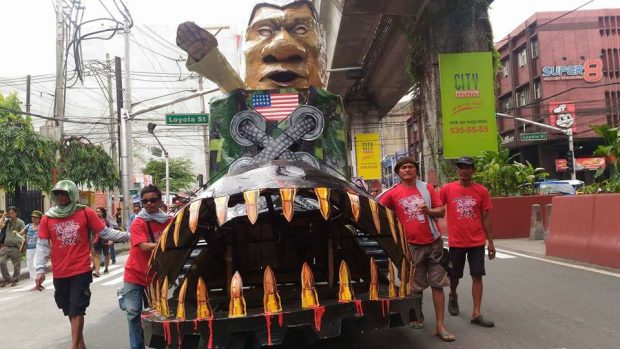By Arnold Padilla / IBON Features
When President Duterte said last month that “all projects of the Philippines would be something like a Swiss Challenge”, media attention has focused on the Swiss Challenge and its implications. But what the presidential statement implied was that in order to supposedly fast track his ambitious Build Build Build program, the administration may encourage more unsolicited proposals and negotiated contracts.
And there lies the real and bigger problem. Unsolicited proposals and negotiated contracts are the worst form of public procurement of infrastructure under the public-private partnership (PPP) scheme. These negotiated deals are the most prone to bureaucratic corruption and to patronage for favored business interests.
Close ties
San Miguel Corporation (SMC) president Ramon Ang, for instance, is among the closest to Malacañang. He is publicly known as one of the (unofficial) major campaign contributors of Pres. Duterte and patron of the Chief Executive’s controversial anti-drug campaign. SMC, a Php255-billion diversified conglomerate and known to cultivate close ties with whoever is in power, is currently implementing theunsolicited Php62.7-billion MRT-7 while awaiting government approval of two more unsolicited mega infrastructure projects.
Based on the revised (2012) Implementing Rules and Regulations (IRR) of the Build-Operate-Transfer (BOT) Law, unsolicited proposals are “project proposals submitted by the private sector, not in response to a formal solicitation or request issued by an Agency/LGU (local government unit) and not part of the list of priority projects as identified by Agency/LGU, to undertake Infrastructure or Development projects.”
A third party could challenge the offer of the original proponent of an unsolicited proposal through what is called the “Swiss Challenge”. In order to bag the contract, the original proponent should match the counter-offer of the third party. In practice, however, all unsolicitedprojects concluded in the Philippines since the 1990s were clinched by the original proponent except in the case of the controversial NAIA Terminal 3 where the challenger (Philippine International Terminals Co. Inc. or PIATCO) won but the contract was declared null and void by the Supreme Court (SC) due to irregularities.
At the start of its term, the Duterte administration’s economic managers already announced that the government is open to unsolicitedproposals aside from its so-called hybrid PPP – i.e. mobilizing official development assistance (ODA) to build infrastructure and later bidding out its operation and maintenance (O&M) to the private sector. Ang, however, called hybrid PPP as “complicated” and expressed preference for unsolicited proposals for supposedly faster delivery of projects.
Following the President’s pronouncement of openness to unsolicited projects, the latter flooded the government, with project proposalsreaching a total of as much as Php3 trillion in the first year of the Duterte administration according to a news report last year. But most of these are just concepts or ideas, with actual proposals under evaluation by the Investment Coordination Committee (ICC) reaching only three as of the latest (January 2018) projects status report from the PPP Center.
But these three unsolicited proposals are among the just five PPP projects that the PPP Center said could probably be rolled out this year. Two of these unsolicited proposals have SMC as the original proponent – the Php700-billion New Manila International Airport and the Php338.8-billion Manila Bay Integrated Flood Control, Coastal Defense and Expressway Project. The third one is the Php51.17-billion East-West Rail Project of Megawide Construction Corp.
A separate news report said that SMC has an unsolicited proposal to the state-run Philippine National Construction Corp. (PNCC) to expand the Metro Manila Skyway and the South Luzon Expressway (SLEX) for Php554 billion.
Combined, the indicative cost of SMC’s reported unsolicited proposals (Php1.59 trillion) already account for 53% of the cost of all unsolicitedproposals (Php3 trillion) reportedly being pitched to the Duterte administration. To get a better grasp of how huge these two projects are, note that the total amount of all (16) PPP projects that have been awarded since the Aquino administration is “just” Php323.06 billion.
Beyond transparency and corruption
Even PPP advocates while recognizing that the presence of unsolicited proposals is on the rise warn governments to use them with caution and within a strict regulatory framework. In a review of unsolicited projects worldwide, a study commissioned by the Public-Private Infrastructure Advisory Facility (PPIAF) of the World Bank noted that among the common concerns on unsolicited proposals are: (1) lack of transparency in selection and implementation of projects; (2) avoidance of competition; (3) avoidance of due diligence processes; (4) opportunities for corruption and political patronage; and (5) acceptance of poor quality projects (design and/or execution) that do not even meet minimum requirements of any sort, in the name of expediency. The World Bank reportedly prohibits the use of unsolicited proposalsin projects that they fund.
Beyond transparency and corruption issues, however, the greater impact of unsolicited proposals involve how such procurement method further weakens the mandate and capacity of the state to design and implement a rational infrastructure program that is responsive to the long-term needs of the people and the economy. Unsolicited proposals also represent how corporate interests that are mainly driven by profit motivation take over infrastructure development and operation, often at the expense of the country’s overall development and social agenda.
Ideally, infrastructure projects are determined by and consistent with the development plan of a country, meaning projects are initiated and prioritized (including in terms of resource allocation) by government based on such plan. Government’s role goes beyond identification, resource mobilization and construction, and extends to operation and maintenance of the infrastructure.
This has been the practice in many countries including the Philippines until the advent of neoliberalism in the 1980s and its rapid expansion in the 1990s. Government’s role has been reduced to listing down of infrastructure projects and soliciting private investors to build and operate them through bidding or direct negotiation. This is already problematic by itself as it essentially privatizes the infrastructure and distorts its economic and social purpose as commercial viability becomes the primary consideration.
Tailor-made public infra for private interests
Unsolicited proposals thus further detach infrastructure development from specific public needs and interests. With the private proponent initiating the process of identification and conceptualization, unsolicited projects are often not reflective of priority infrastructure needs. In addition, unsolicited proposals reinforce the undue concentration of infrastructure development in urban centers and more developed regions at the expense of poorer regions or areas that need more infrastructure, but where commercial prospects or interests are less for private sector proponents.
There are cases where big business proposes infrastructure projects that are not just meant to supply public needs (and directly profit from it) but are also tailor-made to bolster its other private commercial interests. One example is the unsolicited proposal jointly submitted by SM and Ayala groups to build a Php25-billion 8.6-kilometer elevated toll road that will supposedly help decongest traffic along EDSA. But the project will actually benefit the two conglomerates’ property development interests as the proposed toll road would also increase access to the SM Mall of Asia complex and Ayala’s Makati business district. SMC is questioning the SM-Ayala proposal because it will allegedly duplicate the existing SMC-operated NAIA Expressway and affect traffic volume (and profits).
But while SMC is questioning the need for the SM-Ayala’s unsolicited toll road, the wisdom of its own unsolicited New Manila International Airport is also questionable. Under its proposal, SMC will build a massive Php700-billion airport spanning thousands of hectares along Manila Bay in Bulakan, Bulacan with six parallel runways and an initial 100-million passenger capacity (thrice of NAIA’s). But it will also just duplicate the recently awarded Clark International Airport Expansion Project (a solicited PPP deal bagged by Megawide) whose further expansion has lower social (as a new infrastructure, the Bulacan airport could potentially displace more communities) and financial costs (e.g. there are three separate unsolicited proposals to develop Clark airport from JG Summit, Megawide, and Manny Pangilinan’s group with costs ranging from Php187 billion to Php337 billion).
For SMC, the agenda is not just to build and operate an airport that would be an alternative to the highly congested and inefficient NAIA. What SMC wants to build is an “aerotropolis” or a metropolis revolving around an airport. Aside from the 1,168-hectare airport, the plan includes a 2,500-hectare city complex which gives the giant conglomerate additional potential profits from property development as well as a toll road that will link with NLEX, on top of running the airport.
No guarantees
According to the BOT Law and its IRR, unsolicited projects are not entitled to direct government guarantee, subsidy or equity. Nonetheless, like solicited PPP projects, they are still eligible for other perks including investment incentives under the Omnibus Investment Code and performance undertaking (i.e., a government guarantee that it will assume responsibility for the performance of an agency’s obligations under the contractual arrangement including the payment of monetary obligations, in case of default) such as what SMC’s unsolicited MRT-7 project enjoys. They even enjoy “security assistance”, or the deployment of police or military forces in the vicinity of the project site to provide security during the implementation of the project up to completion.
The BOT Law requires as well that proposals be innovative and offer a new concept or technology. But it is unclear what is particularly innovative in an airport in Bulacan or an MRT along Commonwealth Avenue to pass as unsolicited projects. Indeed, a 2012 assessment ofunsolicited projects prepared for the PPP Center (with support from the Asian Development Bank or ADB) concluded that “most (unsolicited)proposals did not really offer new technology”.
What is clear is that there are no guarantees that the country’s chronic infrastructure crisis, which is being used to justify more unsolicitedproposals and negotiated deals, would be solved with more unsolicited projects. On the contrary, undue public burden could increase as numerous but disjointed or impractical networks of roads, airports, and other infrastructure are built through self-serving unsolicitedprojects by big business interest.



